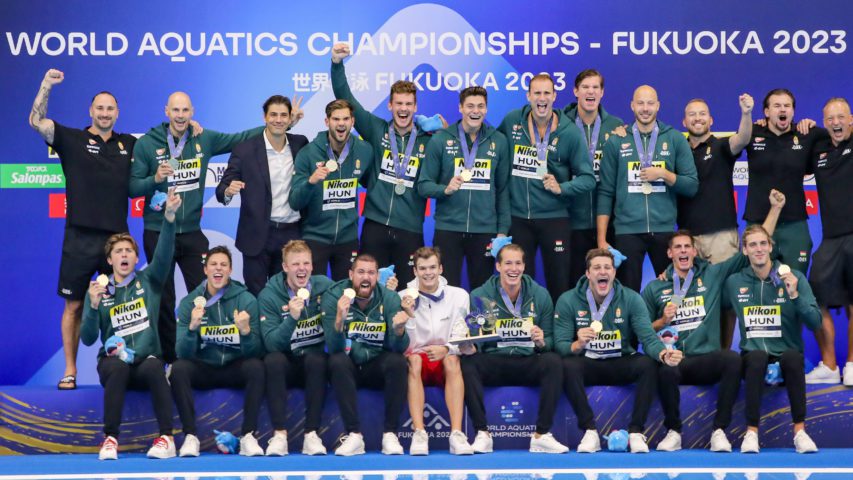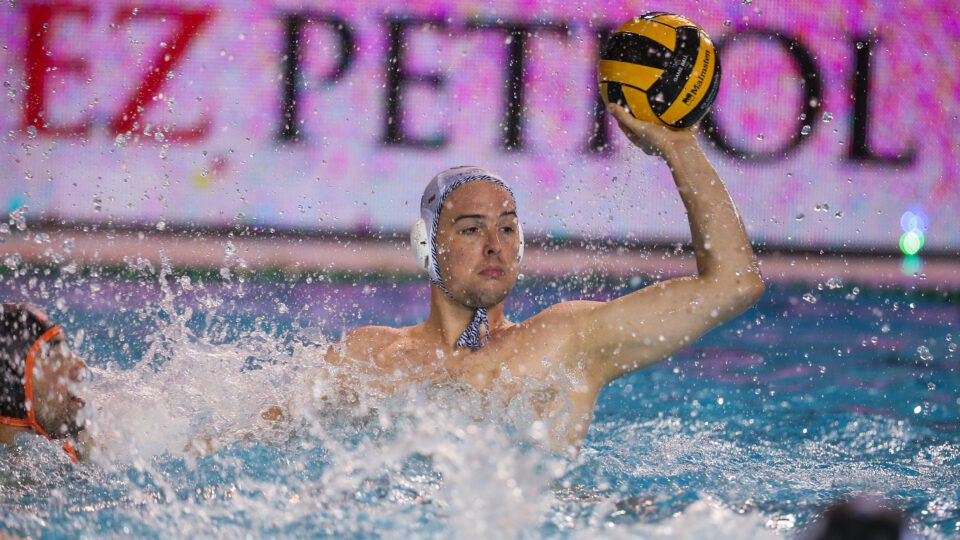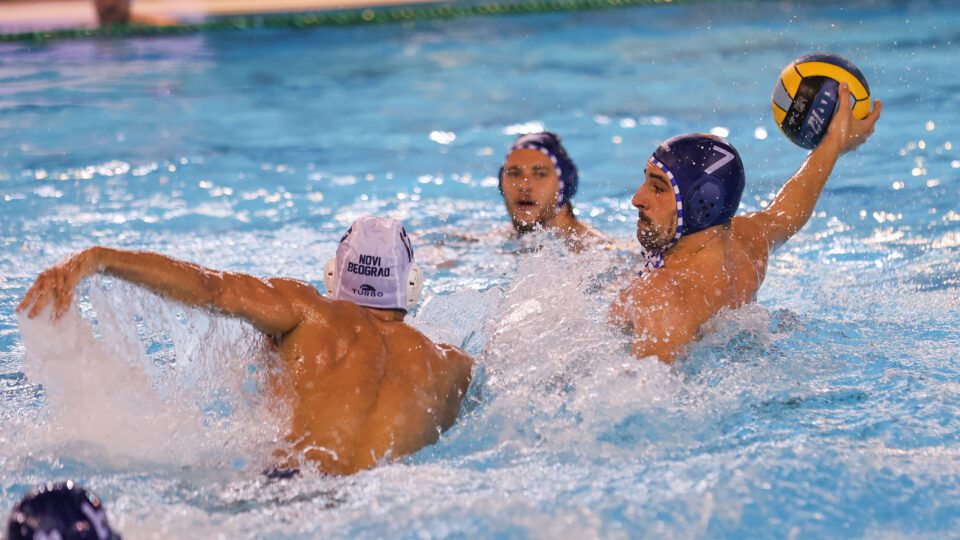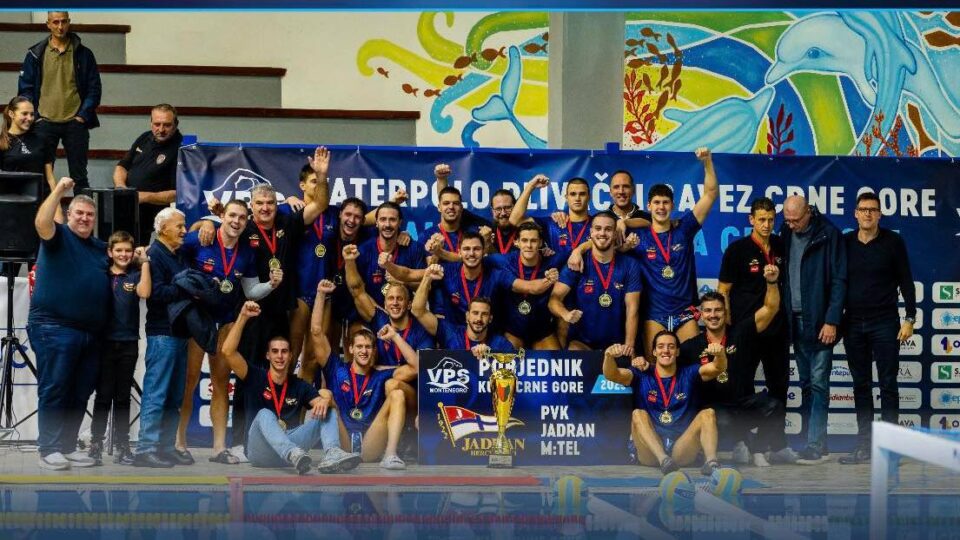Hungary claimed the title of the world champion for men after beating Greece in a wonderful final match of the 20th World Championships in Fukuoka.
The final was an excellent ending to an exciting tournament. Just like in yesterday’s gold-medal match for ladies, there was no winner in a regular time – 10:10, so the battle continued in a penalty shootout. Hungary won 14:13 after seven rounds of shots, thanks to an impressive performance of Hungary’s goalkeeper Soma Vogel who blocked four shots.
.
Vogel blocked four shots, and Hungary became the world champion for the fourth time. The Hungarians won their previous title ten years ago in Barcelona. Today, they caught up with Italy, previously the only male team with four world titles. Hungary is a record holder in the number of medals, having reached the podium at the Worlds 12 times (4 gold, 7 silver and 1 bronze medal).
3 For the third time, the final of the World Men’s Water Polo Championships went into a shootout. In 2009, Serbia beat Spain 14:13 after a penalty shootout thriller. Last year, Spain won its third gold with a 15:14 victory over Italy.
The finalists of the 2022 World Championships recorded quite convincing wins today. Spain beat Serbia 9:6 in the bronze-medal match.
Italy started slowly in the 5th-place game. Still, it beat France by seven goals (16:9).
Team USA took 7th place with a 17:15 victory over Montenegro. After 32 minutes, the score was 12:12 and USA was better in a shootout.
The reports of the bronze-medal match and 7th-place game – HERE
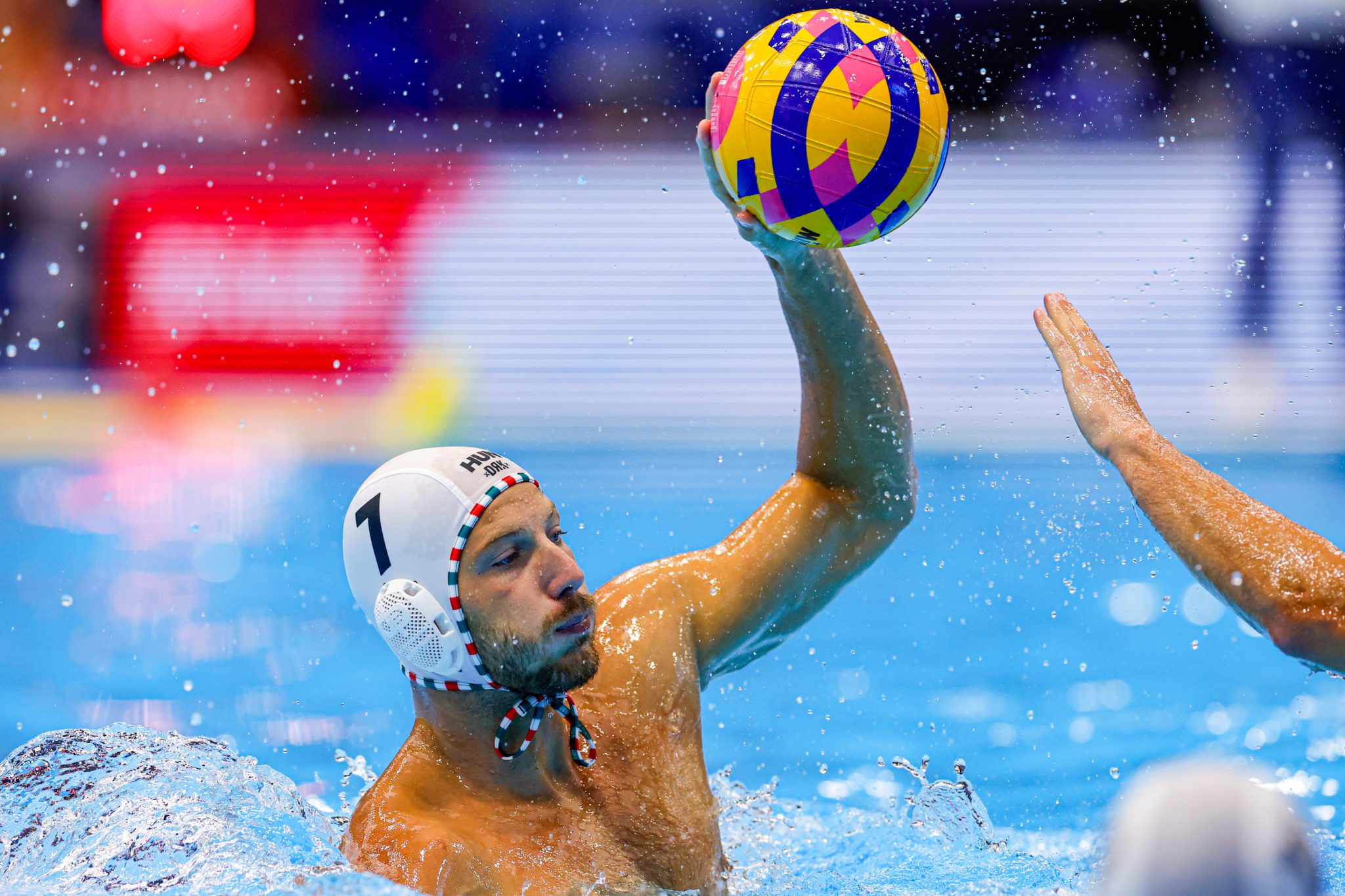
Gergo Zalanki (Hungary) All photos: Orange Pictures
Gergo Zalanki (Hungary) was awarded the best player of the tournament. Emmanouil Zerdevas (Greece) was the best goalkeeper. Strahinja Rasovic (Serbia) deserved the award for the best scorer. He scored 25 goals.
M The results and statistics from the men’s competition are available here
20th World Water Polo Championship (Fukuoka, July 17 – 29), Men, Day 7, evening session
Final
Greece – Hungary 13:14 (2:4, 3:1, 3:2, 3:3, PSO 3:4)
The final game was an even contest for most of the time, the lead exchanged the side several times. Both teams had chances to score a winner in the dying seconds. But, the penalty shootout was the fairest outcome, because it was an equal battle. Both teams deserved a win.
Greece’s Alexandros Papanastasiou successfully converted the team’s first man-up, scoring the first goal of the match. However, Hungary responded with a 3:0 series, and maintained a 2-goal lead for a while (3:1 and 4:2). In the middle of the second period, Genidounias scored from a distance for 3:4, but Manhercz restored a 2-goal lead immediately. Skoumpakis fired the ball in the next possession, and one goal separated the rivals again. Skoumpakis managed to narrow the gap with a goal in the following possession. In the last three minutes of the first half, The Greeks had three man-up opportunities to equalize, but unfortunately for them, they failed to score.
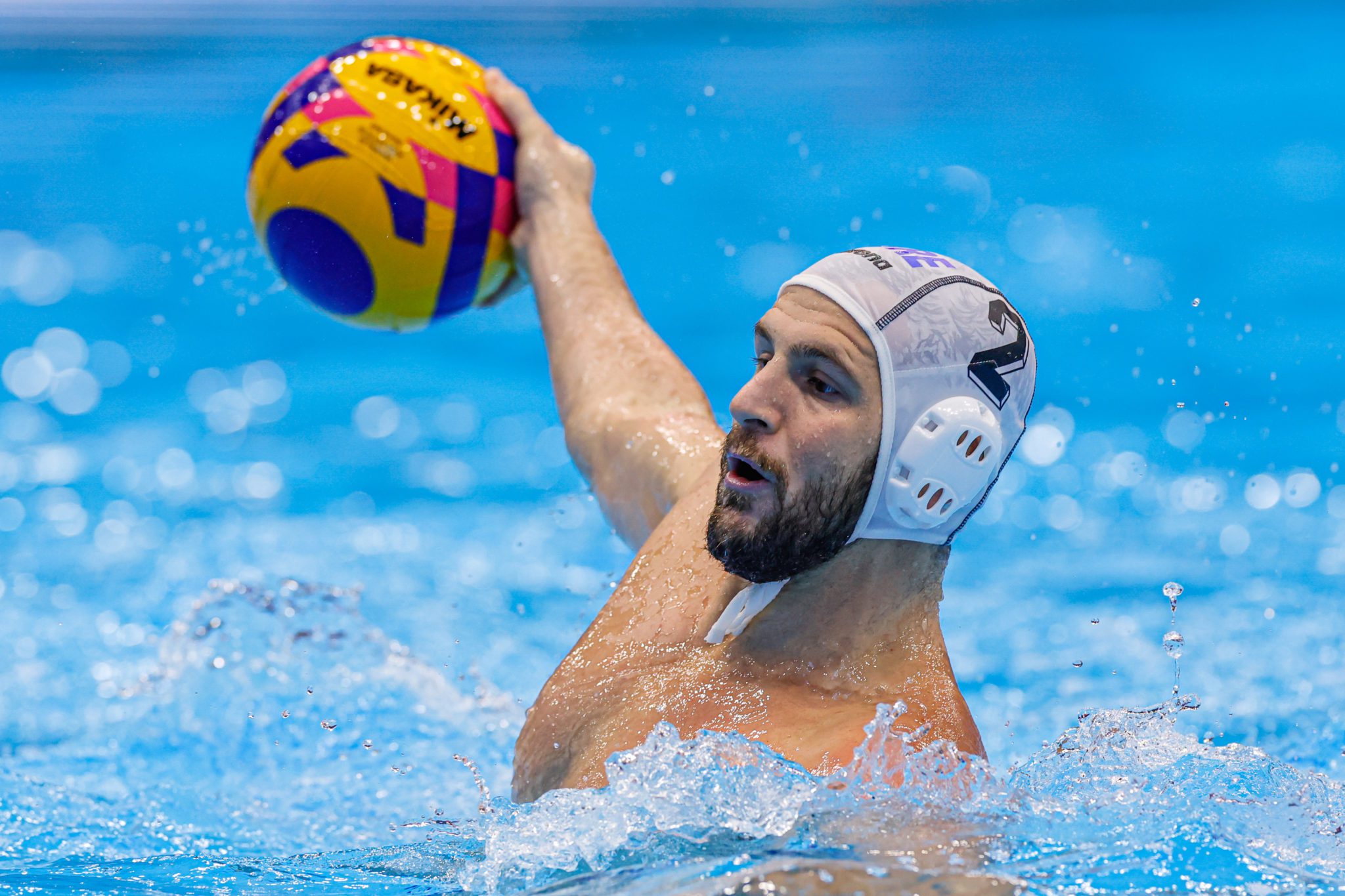
Konstantinos Genidounias
After a series of missed chances, Greece finally equalized in its first possession in the second half. It earned a man-up and then a penalty shot. Konstantinos Genidounias made no mistake from the 5m line. A minute later, Genidounias gave Greece a 6:5 lead. The Greeks had a 7:6 advantage, but Manhercz closed the third quarter with an excellent goal, scored six seconds before the last break, so nothing separated the rivals before the final quarter.
Hungary’s captain Szilard Jansik scored with an extra player and put his team in front for the first time in the second half (8:7). Between the 27th and the 30th minute, the teams quickly exchanged the goals. Fountoulis leveled from a 6 on 5. Krisztian Manhercz scored for 9:8 from a close-range shot after escaping Greece’s defense. But, Gkiouvetsis responded immediately. Gergo Zalanki converted a man-up for 10:9. Still, the Hungarians didn’t have that lead for long, as Genidounias made it 10:10 from an action shot.
Both teams had opportunities to secure a win in the dying seconds. Greece earned a man-up with 35 seconds remaining on the clock. Papanastasiou had his shot blocked at 00:17. Hungary started a counterattack. Still, it ended with no goal,as Zoltan Pohl hit the post.

Soma Vogel
The goalkeepers had the leading roles in the shootout. In the first round, Emmanouil Zerdevas saved a shot from Denes Varga and encouraged the Greeks, but that save was “annulled” immediately after because Soma Vogel blocked a shot from Ioannis Fountoulis. In the next three series, there were four goals. Hungary’s Szilard Jansik and Gergo Fekete failed to score (the first one hit the post, while a shot from Fekete was saved by Zerdevas). At the other end, Vogel saved shots from Gkiouvetsis and Argyropoulos, and the series continued. Varga and Fountoulis made up for misses in the first round. Vamos scored his 2nd goal in the shootout for 4:3 in the 7th round. Then, Vogel posted his 4th save. He didn’t let Papanastasiou hit the back of the net again, and the contest ended. Hungary started celebrating.
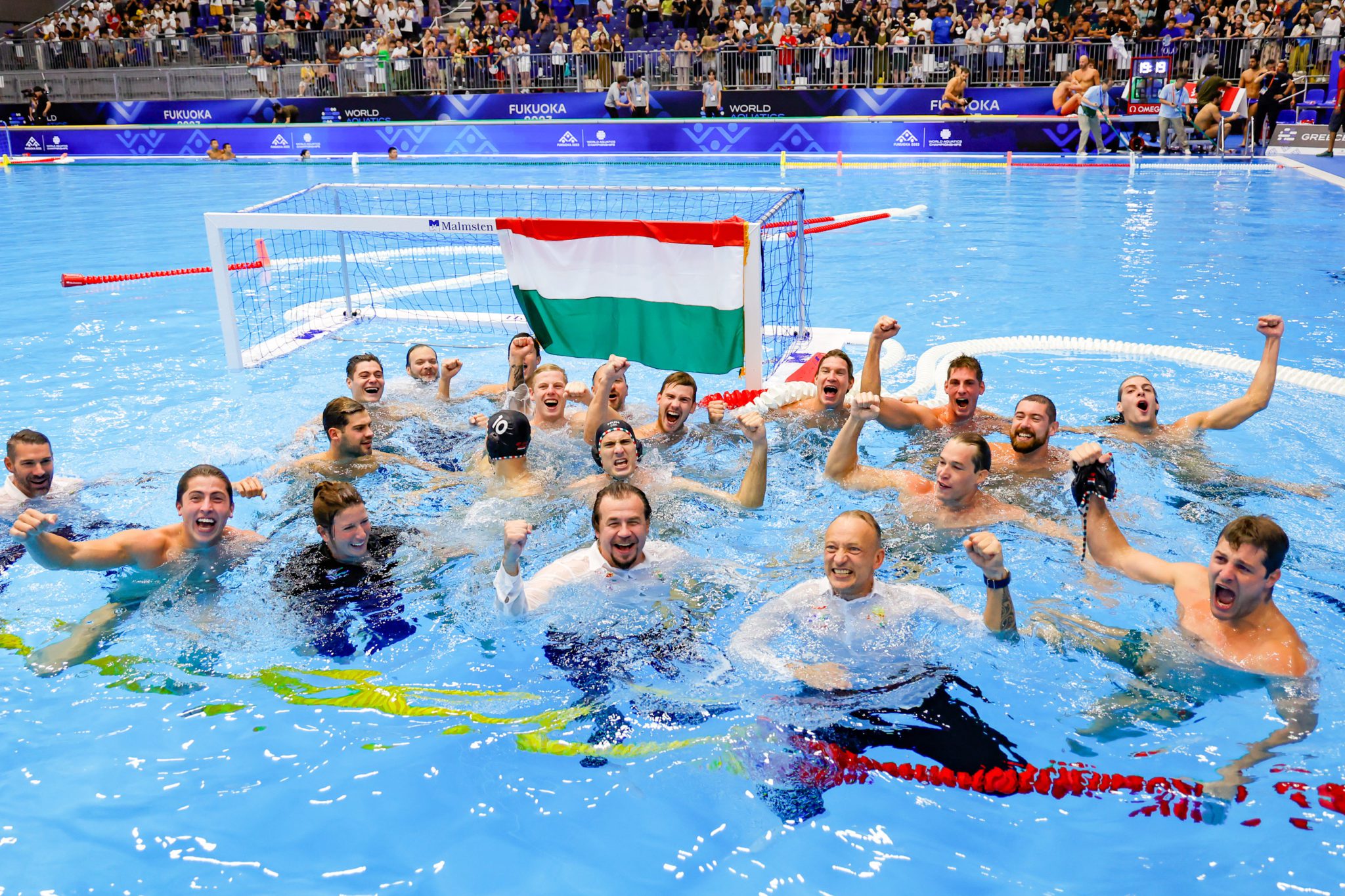
Hungary, the world champion Photo by Albert ten Hove/Orange Pictures
The gold medal is a big jump for the Hungarians after 7th place in front of the home crowd last year. Greece, which won bronze last year, reached the final for the first time in history.
The Greeks might have won if they had had a better percentage of extra player shots They had 10 opportunities but scored only three. Hungary also scored three goals but from six attempts.
Gergo Zalanki and Marton Vamos scored four goals each for Hungary (Zalanki three, and Vamos two in regular time). Krisztian Manhercz, who finished the match earlier because of three personal fouls, netter three times. Greece’s
Konstantinos Genidounias topped the scorers’ list with five goals (four in the regular time).
Soma Vogel posted 12 saves, and Emmanouil Zerdevas 11.
5th-place match
France – Italy 16:9 (1:2, 3:2, 7:3, 5:2)
The French kept Italy goalless until the eighth minute. Their goalkeeper Hugo Fontani was outstanding in the first quarter, like in many other matches in Fukuoka. Ugo Crousillat gave France a 1:0 lead in the 3rd minute from the 5m line. The same player doubled his team’s advantage from a new penalty shot 52 seconds before the first break. Italy earned a penalty shot in its next possession, and Canella converted it to 1:2.
The Italians dictated the pace for most of the second quarter. They netted three goals in a row. Francesco Di Fulvio scored a beautiful goal for 4:2 in the 13th minute. It was the first goal from a 6 on 6 in the match and a wake-up alarm for the French. Their coach Vjekoslav Kobescak, who guided the team today because Florian Bruzzo was excluded in the duel against the USA, called a timeout. Immediately after the short break, Crousillat added his third goal. Bouet closed the half scoring from a distance and the French caught up with the favorite – 4:4.
Presciutti put the Italians in front early in the third period with an action goal. Marzouki leveled from a man-up. Italy then produced a new 4:0 run and jumped to 9:5. France couldn’t recover from the second 0:4 shock. The Italians controlled the match until the end.

Gonzalo Echenique (Italy) Photo by Albert ten Hove/Orange Pictures
Italy defeated France 13:6 in the group stage. Today, the “Settebello” reached a 7-goal margin in the 26th minute when Francesco Di Fulvio made it 14:7 from a counter-attack. The “Settebello” maintained the difference until the final buzzer.
The action shots made the difference. France netted only one goal from a 6-on-6. The remaining eight were with a man-up (5/7) or from the 5m line (3/3). Italy also scored three goals from three penalty shots and five with an extra player (5/10). Francesco Di Fulvio and Giacomo Cannella scored nine goals as all French together – Di Fulvio five and Cannella four. Ugo Crousillat scored three for France.
Fifth place isn’t something that the Italians, silver medalists from Budapest, aspired for. Of course, their ambitions were higher. Still, given that they recorded five convincing wins and suffered only one loss (in a penalty shootout to Serbia in the quarterfinals), Italy shouldn’t be very unsatisfied.
France closed the tournament with a heavy defeat, but the French shouldn’t be disappointed either. After six years, they returned to the Worlds, achieving their most significant success at the WCH. Some powerhouses – Croatia, Montenegro, USA, are behind France.
Final standings
1.Hungary
2. Greece
3. Spain
4. Serbia
5. Italy
6. France
7. USA
8. Montenegro
9. Croatia
10. Australia
11. Japan
12. Canada
13. Argentina
14. Kazakhstan
15. China
16. South Africa
All medal winners
1973 (Belgrade): 1. Hungary, 2. USSR, 3. Yugoslavia
1975 (Cali): 1. USSR, 2. Hungary, 3. Italy
1978 (West Berlin): 1. Italy, 2. Hungary, 3. Yugoslavia
1982 (Guayaquil): 1. USSR, 2. Hungary, 3. FR Germany
1986 (Madrid): 1. Yugoslavia, 2. Italy, 3. USSR
1991 (Perth): 1. Yugoslavia, 2. Spain, 3. Hungary
1994 (Rome): 1. Italy, 2. Spain, 3. Russia
1998 (Perth): 1. Spain, 2. Hungary, 3. Yugoslavia
2001 (Fukuoka): 1. Spain, 2. Yugoslavia, 3. Russia
2003 (Barcelona): 1. Hungary, 2. Italy, 3. Serbia and Montenegro
2005 (Montreal): 1. Serbia and Montenegro, 2. Hungary, 3. Greece
2007 (Melbourne): 1. Croatia, 2. Hungary, 3. Spain
2009 (Rome): 1. Serbia, 2. Spain, 3. Croatia
2011 (Shanghai): 1. Italy, 2. Serbia, 3. Croatia
2013 (Barcelona): 1. Hungary, 2. Montenegro, 3. Croatia
2015 (Kazan): 1. Serbia, 2. Croatia, 3. Greece
2017 (Budapest): 1. Croatia, 2. Hungary, 3. Serbia
2019 (Gwangju): 1. Italy, 2. Spain, 3. Croatia
2022 (Budapest): 1. Spain, 2. Italy, 3. Greece
2023 (Fukuoka): 1, Hungary 2. Greece, 3. Spain
For more news and all the results of the World Championships in Fukuoka, visit Total Waterpolo’s 2023 World Championships page.
More articles about the World Championships
Follow us on Facebook, Twitter and Instagram. For more video content, subscribe to our Youtube Channel and Tik Tok account



